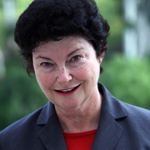UCI sociologist studies issues facing elderly immigrants

UCI sociologist studies issues facing elderly immigrants
- October 19, 2009
- Research by sociology professor Judith Treas sheds light on foreign-born seniors in the U.S.
 The nearly 80,000 immigrants older than 65 who arrive in the U.S. each year are often
overlooked by society because they don't hold paid jobs or speak fluent English, says
UC Irvine sociology professor Judith Treas.
The nearly 80,000 immigrants older than 65 who arrive in the U.S. each year are often
overlooked by society because they don't hold paid jobs or speak fluent English, says
UC Irvine sociology professor Judith Treas.
These people come to America too late in life to attend public schools or find regular
employment, she says. They don't qualify for retirement benefits or social services
and usually depend entirely on their families for financial support.
"Elderly immigrants remain in the shadows," says Treas, whose research on them was
recently published in Generations, a journal of the American Society on Aging. "They never win spelling bees. They
don't join criminal gangs. Nobody worries about Americans losing jobs to Korean grandmothers."
In California, nearly one in three seniors is foreign-born, according to a 2007 survey.
Most are from Asia and Latin America.
Treas' research findings challenge certain stereotypes. "Americans tend to label immigrants
as family-oriented and highly respectful of elders," she says. "But older immigrants
don't usually control family incomes or know how to navigate U.S. society, so they
don't get to call the shots."
Over the last 15 years, Treas and her students have interviewed many foreign-born
seniors and their relatives and friends. The immigrants have come from a wide range
of countries, including Iran, Mexico, Korea, Pakistan and Cambodia.
Treas thinks another compelling finding is that for many elderly immigrants, family
life does not provide the happiness or security they expected.
"Research shows high rates of depression among older immigrants, especially newcomers,"
she says. "Family members are frequently too busy going to school or earning a living
to provide companionship."
Many foreign-born seniors have lifestyles that would be considered unconventional
in their native cultures. Immigrant women, for example, often find themselves traveling
unaccompanied between the U.S. and their homeland or doing household chores that would
be relegated to servants back home.
Treas hopes her research will raise awareness of the issues facing elderly immigrants
- and awareness of elderly immigrants in general.
"In Irvine," she notes, "it's not uncommon to see Russian and Chinese grandparents
pushing strollers around University Hills."
--Laura Rico, University Communications
Share on:


connect with us